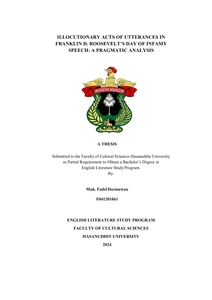Darmawan, Muh. Fadel (2024) Tindak Tutur Ilokusi Dalam Pidato Day of Infamy Franklin D. Roosevelt: Analisis Pragmatis. Skripsi thesis, universitas hasanuddin makassar.
F041201061_skripsi_04-09-2024 bab 1-2.pdf
Download (1MB)
![[thumbnail of F041201061_skripsi_04-09-2024 cover1.jpg]](/38759/2.hassmallThumbnailVersion/F041201061_skripsi_04-09-2024%20cover1.jpg)

F041201061_skripsi_04-09-2024 cover1.jpg
Download (288kB) | Preview
F041201061_skripsi_04-09-2024 dp.pdf
Download (336kB)
F041201061_skripsi_04-09-2024.pdf
Restricted to Repository staff only
Download (1MB)
Abstract (Abstrak)
This research aims to (1) classify the types of illocutionary acts used by Franklin D. Roosevelt in his speech entitled Day of Infamy, and (2) analyze the meanings of illocutionary acts used by Franklin D. Roosevelt in the speech. This study used a qualitative descriptive method. The data were obtained from the video of the speech with the help of the speech transcript. The types of illocutionary acts were classified based on the theory of John Searle, while the meanings of direct and indirect illocutionary act were analyzed based on the theory of James R. Hurford. The data analysis was conducted in several steps. First the writer reviewed the video, and identified the illocutionary acts of the selected utterances. After that, the writer determined the direct and indirect illocutionary acts of the utterances. Finally, the writer made conclusions after preparing the written report of the analysis. Based on the results of the analysis, four types of illocutionary acts were found in 22 selected utterances, including assertive, directive, commissive, and expressive. There was no declarative illocutionary act found by the writer in the speech. Additionally, the direct illocutionary acts were found, including asserting, informing, promising, committing, regretting, and requesting, while the indirect illocutionary acts were condemning, warning, urging, ordering, committing, asserting, reassuring, justifying, and informing.
| Item Type: | Thesis (Skripsi) |
|---|---|
| Subjects: | P Language and Literature > PR English literature |
| Divisions (Program Studi): | Fakultas Ilmu Budaya > Sastra Inggris |
| Depositing User: | Unnamed user with username chandra |
| Date Deposited: | 31 Oct 2024 02:12 |
| Last Modified: | 31 Oct 2024 02:12 |
| URI: | http://repository.unhas.ac.id:443/id/eprint/38759 |


